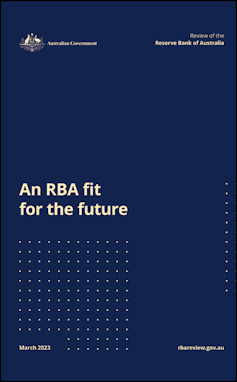Governments have been able to overrule the Reserve Bank for 80 years. Why stop now?
- Written by Peter Martin, Visiting Fellow, Crawford School of Public Policy, Australian National University

Pay close enough attention to parliament these next few days, and you’re likely to witness something truly remarkable: politicians from both sides of politics uniting to remove the power of politicians to overrule the Reserve Bank.
As an instance of self-loathing, it’s hard to top.
Sure, a good many of us don’t trust politicians. But surely politicians ought to trust politicians. Surely politicians ought to realise that we put them there to make decisions – not usually the day-to-day decisions, but the ultimate big decisions. They are meant to be where the buck stops[1].
That Treasurer Jim Chalmers could be even thinking about axing[2] his ultimate power to veto decisions of the Reserve Bank board shows just how far the myth of an “independent Reserve Bank” has spread.
Scroll through the treasurer’s website, and you’ll find 195 documents referring to the “independent Reserve Bank[3]”, many multiple times.
‘Independent’, but not according to the law
Saying the Reserve Bank is independent suits the treasurer and it suits the prime minister, just as it has suited many of their predecessors. As soon as the bank does something that’s necessary but unpopular (such as pushing up interest rates) they are able to say – wrongly – there’s nothing they can do.
The government’s Reserve Bank is dependent on the government in myriad ways.
The government set up[4] the Reserve Bank. The government appoints every member of its board. The government directly appoints its chief[5] and deputy chief[6]. And from time to time the government gives it running instructions[7].
But – most importantly – the government can overrule it.
The mechanism is built into[8] the Reserve Bank Act.
In the event of a disagreement, the treasurer can
submit a recommendation to the governor-general, and the governor-general, acting with the advice of the Federal Executive Council, may, by order, determine the policy to be adopted by the bank.
The government is to accept responsibility for the decision taken, and the Reserve Bank board must
thereupon ensure that effect is given to the policy determined by the order and shall, if the order so requires, continue to ensure that effect is given to that policy while the order remains in operation.
After so directing the bank, the treasurer is to table in parliament a copy of the direction, along with a statement explaining the reasons, and a statement from the Reserve Bank board putting the case that failed to convince the treasurer.
These are the clauses – until now unused – that in April the outside review of the Reserve Bank asked the government to do away with[9].
Its thinking was that the government can’t be trusted.
As the review put it
if an elected government controls monetary policy there are risks that it may try to push the economy to run above its capacity, resulting in higher inflation but with no lasting impact on employment.
On releasing the review’s recommendations, Treasurer Jim Chalmers said straight away that he agreed in principle with all of them[10].
Shadow Treasury Angus Taylor said much the same thing[11], although he now says the Coalition will wait until sees the legislation Chalmers is about to introduce before deciding its position on it.














